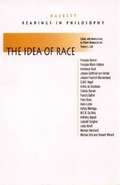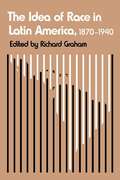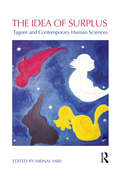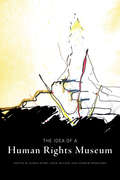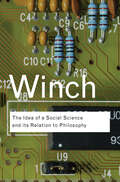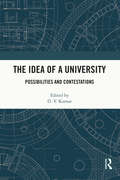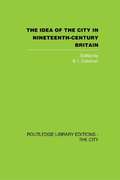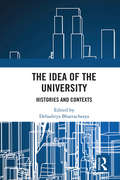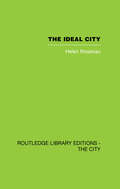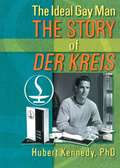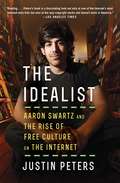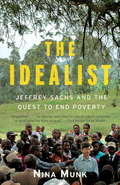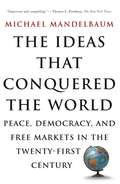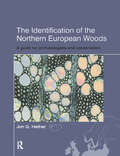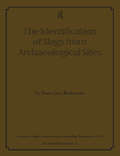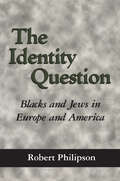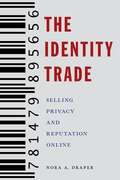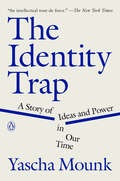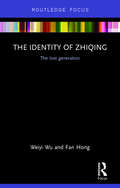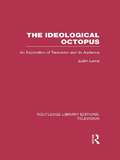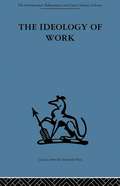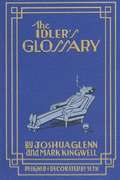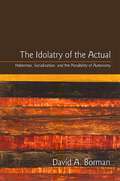- Table View
- List View
The Idea of Race
by Tommy L. Lott Robert BernasconiA survey of the historical development of the idea of race, this anthology offers pre-twentieth century theories about the concept of race, classic twentieth century sources reiterating and contesting ideas of race as scientific, and several philosophically relevant essays that discuss the issues presented. A general Introduction gives an overview of the readings. Headnotes introduce each selection. Includes suggested further readings.
The Idea of Race in Latin America, 1870-1940
by Richard GrahamFrom the mid-nineteenth century until the 1930s, many Latin American leaders faced a difficult dilemma regarding the idea of race. On the one hand, they aspired to an ever-closer connection to Europe and North America, where, during much of this period, "scientific" thought condemned nonwhite races to an inferior category. Yet, with the heterogeneous racial makeup of their societies clearly before them and a growing sense of national identity impelling consideration of national futures, Latin American leaders hesitated. What to do? Whom to believe?Latin American political and intellectual leaders' sometimes anguished responses to these dilemmas form the subject of The Idea of Race in Latin America. Thomas Skidmore, Aline Helg, and Alan Knight have each contributed chapters that succinctly explore various aspects of the story in Brazil, Argentina, Cuba, and Mexico. While keenly alert to the social and economic differences that distinguish one Latin American society from another, each author has also addressed common issues that Richard Graham ably draws together in a brief introduction. Written in a style that will make it accessible to the undergraduate, this book will appeal as well to the sophisticated scholar.
The Idea of Surplus: Tagore and Contemporary Human Sciences
by Mrinal MiriThis book provides an analytical understanding of some of Tagore’s most contested and celebrated works and ideas. It reflects on his critique of nationalism, aesthetic worldview, and the idea of ‘surplus in man’ underlying his life and works. It discusses the creative notion of surplus that stands not for ‘profit’ or ‘value’, but for celebrating human beings’ continuous quest for reaching out beyond one’s limits. It highlights, among other themes, how the idea of being ‘Indian’ involves stages of evolution through a complex matrix of ideals, values and actions—cultural, historical, literary and ideological. Examining the notion of the ‘universal’, contemporary scholars come together in this volume to show how ‘surplus in man’ is generated over the life of concrete particulars through creativity. The work brings forth a social scientific account of Tagore’s thoughts and critically reconstructs many of his epochal ideas. Lucid in analysis and bolstered with historical reflection, this book will be a major intervention in understanding Tagore’s works and its relevance for the contemporary human and social sciences. It will interest scholars and researchers of philosophy, literature and cultural studies.
The Idea of a Human Rights Museum
by Ruth B. Phillips Mary Reid A. Dirk Moses Adam Muller Andrew Woolford Angela Failler Christopher Powell Karen Busby Jennifer Carter Clint Curle Helen Fallding Jodi Giesbrecht Amanda Grzyb George Jacob Stephen Jaeger Jorge A. Nállim Ken Norman Armando Perla David Petrasek Roger I. Simon Struan Sinclair"The Idea of a Human Rights Museum" is the first book to examine the formation of the Canadian Museum for Human Rights and to situate the museum within the context of the international proliferation of such institutions. Sixteen essays consider the wider political, cultural and architectural contexts within which the museum physically and conceptually evolved drawing comparisons between the CMHR and institutions elsewhere in the world that emphasize human rights and social justice. This collection brings together authors from diverse fields—law, cultural studies, museum studies, sociology, history, political science, and literature—to critically assess the potentials and pitfalls of human rights education through “ideas” museums. Accessible, engaging, and informative, the collection’s essays will encourage museum-goers to think more deeply about the content of human rights exhibits. The Idea of a Human Rights Museum is the first title in the University of Manitoba Press’s Human Rights and Social Justice Series. This series publishes work that explores the quest for social justice and the basic rights and freedoms to which all human beings are entitled, including civil, political, economic, social, collective, and cultural rights.
The Idea of a Social Science and its Relation to Philosophy
by Peter WinchIn the fiftieth anniversary of this book's first release, Winch's argument remains as crucial as ever. Originally published in 1958, The Idea of a Social Science and Its Relation to Philosophy was a landmark exploration of the social sciences, written at a time when that field was still young and had not yet joined the Humanities and the Natural Sciences as the third great domain of the Academy. A passionate defender of the importance of philosophy to a full understanding of 'society' against those who would deem it an irrelevant 'ivory towers' pursuit, Winch draws from the works of such thinkers as Ludwig Wittgenstein, J. S. Mill and Max Weber to make his case. In so doing he addresses the possibility and practice of a comprehensive 'science of society'.
The Idea of a University: Possibilities and Contestations
by D. V. KumarThis volume engages with the idea of a university, the importance of intellectual inquiry and research, and the articulation of diverse political views and dissent. It discusses the prominent ideas and debates around universities and their nature and contributions, within the historical and social context of India. The chapters reflect on the importance of critical thinking and the rigorous research process, the engagement of students with socio-political discourse, and academic freedom. They also examine issues around the instrumentalisation of knowledge production, commodification of education, the clash between political forces and universities, intellectual freedom in research and teaching, inclusivity and accessibility of higher education, as well as the autonomy and identity of universities. With insightful contributions from prominent scholars and thinkers in India, this volume will be of interest to academics and students of sociology, political science, education, public policy and governance, philosophy of education and South Asian studies. It will also be useful for readers interested in the debates on universities and their relationship with politics and society.
The Idea of the City in Nineteenth-Century Britain
by B. I. ColemanIn nineteenth-century Britain, ahead of the rest of the world in economic development, many towns and cities grew to a size that only London had attained before. This volume focuses on the intellectual and controversial response of the period's leading men and women to the key issues of urbanization and its surrounding social problems. The extracts selected date from 1785 to 1909, and are drawn from the writings, reports and speeches of admirers of city life and its most passionate critics, optimists and alarmists, advocates of back-to-the-land panaceas, and reformers who aspired to control and reform cities. Contemporaries quoted include Dickens, Cobbett, Carlyle, Disraeli, Engels, Mrs Gaskell, Ruskin, Joseph Chamberlain, William Morris, Charles Booth, H.G. Wells and Seebohm Rowntree. In a valuable introduction the editor indicates the main preoccupations of the debate abotu the city, proposes a periodization for it, adn shows its connections with other controversies and issues, as Victorian Britain found itself entering an 'age of great cities'. This book was first published in 1973.
The Idea of the Muslim World: A Global Intellectual History
by Cemil AydinAs Cemil Aydin explains in this provocative history, it is a misconception to think that the world’s 1.5 billion Muslims constitute a single religio-political entity. How did this mistaken belief arise, why is it so widespread, and how can its grip be loosened so that a more fruitful discussion about politics in Muslim societies can begin?
The Idea of the University: Histories and Contexts
by Debaditya BhattacharyaWhat is this ‘idea’ of the university? Why does it need to be defended? Does the work of defense preclude the task of rearranging the idea itself? Drawing on these essential questions, this volume traces the historical transformations of the university in medieval Europe and explores current debates on its existence and sustenance in a neoliberal India. It challenges the liberal-humanist ‘ideal’ of academic exchange to inquire into long befuddled debates on the true nature of the modern university. Along with its companion The University Unthought: Notes for a Future, this brave new intervention makes a compelling foray into the political future(s) of the university. It will be of interest to academics, educators and students of the social sciences and humanities, especially education. It will also be of use to policy-makers and education analysts, and central to the concerns of any citizen.
The Ideal City: Its Architectural Evolution in Europe
by Helen RosenauThe concept of the 'ideal city' is, perhaps, more important today - when planners and architects are so firmly confined by considerations of our immediate environment - than ever before. Yet it is a concept which has profoundly influenced the western world throughout history, both as a regulative model and as an inspiration. Rosenau traces the progress of the concept from biblical sources through the hellenistic and Roman empires to the Renaissance and the later Age of Enlightenment, when the emphasis shifted from religious to social considerations. She goes on to discuss the resultant nineteenth-century ideal planning, when the idea of social betterment was approached with a specific and conscious effort. This book was first published in 1983.
The Ideal Gay Man: The Story of Der Kreis
by Hubert KennedyDiscover the deliciously succulent homosexual world of the early 1900s!The Ideal Gay Man: The Story of Der Kreis gives you the history of the influential international gay journal Der Kreis, published in Switzerland from 1932--1967. You’ll gain fascinating insight into the journal’s origins, its development, and the reasons for its demise. Entertaining and informative, this book points out how the events of the day relating to the gay movement were reflected in and influenced by Der Kreis.Der Kreis was the world’s most important journal promoting the legal and social rights of gay men. Literary historians, gay theory scholars, and general readers will be intrigued by the generous selection of articles from the English section of the journal, as well as the English translations from the French and German sections. The Ideal Gay Man is a fascinating collection of history and entertainment. Some topics you’ll explore are: the beginning of the publication Der Kreis why Der Kreis stopped publication sections on the English writers, French writers, and German writers of Der Kreis articles on morality and the public’s changing perceptions of homosexuality man and boy love and the differences between leading and seductionThe Ideal Gay Man studies this amazingly influential gentlemen’s journal and provides you with a flattering and long overdue inclusion into gay studies material. You will explore the homosexual world during a turbulent time of intolerance and discover how the events relating to the gay movement were reflected in and influenced by Der Kreis.
The Idealist
by Justin PetersA smart, lively history of the Internet free culture movement and its larger effects on society--and the life and shocking suicide of Aaron Swartz, a founding developer of Reddit and Creative Commons--from Slate correspondent Justin Peters.Aaron Swartz was a zealous young advocate for the free exchange of information and creative content online. He committed suicide in 2013 after being indicted by the government for illegally downloading millions of academic articles from a nonprofit online database. From the age of fifteen, when Swartz, a computer prodigy, worked with Lawrence Lessig to launch Creative Commons, to his years as a fighter for copyright reform and open information, to his work leading the protests against the Stop Online Piracy Act (SOPA), to his posthumous status as a cultural icon, Swartz's life was inextricably connected to the free culture movement. Now Justin Peters examines Swartz's life in the context of 200 years of struggle over the control of information. In vivid, accessible prose, The Idealist situates Swartz in the context of other "data moralists" past and present, from lexicographer Noah Webster to ebook pioneer Michael Hart to NSA whistleblower Edward Snowden. In the process, the book explores the history of copyright statutes and the public domain; examines archivists' ongoing quest to build the "library of the future"; and charts the rise of open access, copyleft, and other ideologies that have come to challenge protectionist IP policies. Peters also breaks down the government's case against Swartz and explains how we reached the point where federally funded academic research came to be considered private property, and downloading that material in bulk came to be considered a federal crime. The Idealist is an important investigation of the fate of the digital commons in an increasingly corporatized Internet, and an essential look at the impact of the free culture movement on our daily lives and on generations to come.
The Idealist
by Nina MunkNAMED ONE OF THE BEST BOOKS OF THE YEAR BY Bloomberg * Forbes * The SpectatorRecipient of Foreign Policy's 2013 Albie AwardA powerful portrayal of Jeffrey Sachs's ambitious quest to end global poverty "The poor you will always have with you," to cite the Gospel of Matthew 26:11. Jeffrey Sachs--celebrated economist, special advisor to the Secretary General of the United Nations, and author of the influential bestseller The End of Poverty--disagrees. In his view, poverty is a problem that can be solved. With single-minded determination he has attempted to put into practice his theories about ending extreme poverty, to prove that the world's most destitute people can be lifted onto "the ladder of development." In 2006, Sachs launched the Millennium Villages Project, a daring five-year experiment designed to test his theories in Africa. The first Millennium village was in Sauri, a remote cluster of farming communities in western Kenya. The initial results were encouraging. With his first taste of success, and backed by one hundred twenty million dollars from George Soros and other likeminded donors, Sachs rolled out a dozen model villages in ten sub-Saharan countries. Once his approach was validated it would be scaled up across the entire continent. At least that was the idea. For the past six years, Nina Munk has reported deeply on the Millennium Villages Project, accompanying Sachs on his official trips to Africa and listening in on conversations with heads-of-state, humanitarian organizations, rival economists, and development experts. She has immersed herself in the lives of people in two Millennium villages: Ruhiira, in southwest Uganda, and Dertu, in the arid borderland between Kenya and Somalia. Accepting the hospitality of camel herders and small-hold farmers, and witnessing their struggle to survive, Munk came to understand the real-life issues that challenge Sachs's formula for ending global poverty. THE IDEALIST is the profound and moving story of what happens when the abstract theories of a brilliant, driven man meet the reality of human life.
The Idealist: Aaron Swartz and the Rise of Free Culture on the Internet
by Justin PetersThis smart, “riveting” (Los Angeles Times) history of the Internet free culture movement and its larger effects on society—and the life and shocking suicide of Aaron Swartz, a founding developer of Reddit and Creative Commons—written by Slate correspondent Justin Peters “captures Swartz flawlessly” (The New York Times Book Review).Aaron Swartz was a zealous young advocate for the free exchange of information and creative content online. He committed suicide in 2013 after being indicted by the government for illegally downloading millions of academic articles from a nonprofit online database. From the age of fifteen, when Swartz, a computer prodigy, worked with Lawrence Lessig to launch Creative Commons, to his years as a fighter for copyright reform and open information, to his work leading the protests against the Stop Online Piracy Act (SOPA), to his posthumous status as a cultural icon, Swartz’s life was inextricably connected to the free culture movement. Now Justin Peters examines Swartz’s life in the context of 200 years of struggle over the control of information. In vivid, accessible prose, The Idealist situates Swartz in the context of other “data moralists” past and present, from lexicographer Noah Webster to ebook pioneer Michael Hart to NSA whistleblower Edward Snowden. In the process, the book explores the history of copyright statutes and the public domain; examines archivists’ ongoing quest to build the “library of the future”; and charts the rise of open access, the copyleft movement, and other ideologies that have come to challenge protectionist intellectual property policies. Peters also breaks down the government’s case against Swartz and explains how we reached the point where federally funded academic research came to be considered private property, and downloading that material in bulk came to be considered a federal crime. The Idealist is “an excellent survey of the intellectual property battlefield, and a sobering memorial to its most tragic victim” (The Boston Globe) and an essential look at the impact of the free culture movement on our daily lives and on generations to come.
The Ideas That Conquered The World: Peace, Democracy, And Free Markets In The Twenty-first Century
by Michael MandelbaumOne of America's leading foreign policy thinkers provides an important and compelling look at today's new power realities Thomas L. Friedman, "The New York Times"
The Identification of Northern European Woods: A Guide for Archaeologists and Conservators (UCL Institute of Archaeology Publications)
by Jon G HatherThis technical and well-illustrated guide for archaeologists and conservators aims to `provide a methodology for the identification of the woody taxa used to manufacture artefacts recovered from archaeological excavations', to provide the anatomical descriptions of the taxa and to present a list of characters of the taxa. The guide is heavily illustrated with photographs, maps, and tables to allow easy identification.
The Identification of Slags from Archaeological Sites (UCL Institute of Archaeology Publications)
by Hans-Gert BachmannThis is a guide to the field identification and laboratory analysis of metallic slags found in archaeological sites.
The Identity Question: Blacks and Jews in Europe and America
by Robert PhilipsonDespite the Enlightenment's promise of utopian belonging among all citizens, blacks and Jews were excluded from the life of their host countries. In their diasporic exile both groups were marginalized as slaves, aliens, unbelievers, and frequently not fully human. The Identity Question: Blacks and Jews in Europe and America explores the effects of diaspora upon black and Jewish consciousness, demonstrating similar histories of marginality and oppression.Casting off the fixed social categories of an earlier age, Enlightenment thinkers argued that all men in their capacity as citizens of a secular state had the right to full civic participation and equal protection under the law. In theory, such an ideology did not recognize classes or races of men automatically excluded from citizenship. In fact, negative images of blacks and Jews continued to inform European thought and policy, providing a rationale for a thriving slave trade abroad and continued oppression of Jews at home. Thus blacks and Jews were forced to define themselves in accordance with or in opposition to European ideas about who they were. Of necessity, blacks struggled against the stereotypes of black barbarism and bestiality. Jewish intellectuals protested their alleged moral unfitness to participate in society, while proclaiming primary allegiance to their host country rather than to other Jews.Central to this examination are four key autobiographies, two from the late 1700s and two from recent history. The autobiographies of Richard Wright and Alfred Kazin, taken as prime twentieth-century American expressions of racial and ethnic identity, reveal striking similarities to their Enlightenment counterparts in Europe, the black Olaude Equiano and the Jewish Salomon Maimon. Equiano, Maimon, Kazin, and Wright all accept the ultimate desirability of Western culture. All believe in the Enlightenment promise. All were ostracized by the larger political cultures of Great Britain, Germany, and America, but each made an arduous journey from the ethnic margins of language, culture, and "tribal" loyalty to the cosmopolitan center of London, Berlin, Chicago, or New York. These modern European conceptions of black and Jewish identity, as well as the modern forms of racism that came to term in the eighteenth century, entered America whole cloth. Consequently, American intellectual and social history of the twentieth century mirrors the same movements toward acceptance and ostracism that had existed in Enlightenment Europe.
The Identity Trade: Selling Privacy and Reputation Online (Critical Cultural Communication #7)
by Nora A. DraperThe successes and failures of an industry that claims to protect and promote our online identitiesWhat does privacy mean in the digital era? As technology increasingly blurs the boundary between public and private, questions about who controls our data become harder and harder to answer. Our every web view, click, and online purchase can be sold to anyone to store and use as they wish. At the same time, our online reputation has become an important part of our identity—a form of cultural currency.The Identity Trade examines the relationship between online visibility and privacy, and the politics of identity and self-presentation in the digital age. In doing so, Nora Draper looks at the revealing two-decade history of efforts by the consumer privacy industry to give individuals control over their digital image through the sale of privacy protection and reputation management as a service.Through in-depth interviews with industry experts, as well as analysis of media coverage, promotional materials, and government policies, Draper examines how companies have turned the protection and promotion of digital information into a business. Along the way, she also provides insight into how these companies have responded to and shaped the ways we think about image and reputation in the digital age.Tracking the successes and failures of companies claiming to control our digital ephemera, Draper takes us inside an industry that has commodified strategies of information control. This book is a discerning overview of the debate around who controls our data, who buys and sells it, and the consequences of treating privacy as a consumer good.
The Identity Trap: A Story of Ideas and Power in Our Time
by Yascha MounkNamed a Best Book of the Year by The Economist, Financial Times, Inc., Prospect Magazine, and The Conversation&“The most comprehensive and reasonable story of this shift that has yet been attempted . . . Mounk has told the story of the Great Awokening better than any other writer who has attempted to make sense of it.&” —The Washington Post&“An intellectual tour de force about the origins of identity politics and the threat it presents to genuine, honest, old-fashioned liberalism.&” —Bret Stephens, The New York Times&“Among the most insightful and important books written in the last decade on American democracy and its current torments, because it also shows us a way out of the trap.&” —Jonathan Haidt, author of The Righteous Mind, and coauthor of The Coddling of the American Mind&“Outstanding.&” —David Brooks, The New York TimesA fascinating account of the origins of &“wokeness&”—and a trenchant explanation for why the noble goals of identity politics are doomed to failFor much of history, societies have violently oppressed ethnic, religious, and sexual minorities. It is no surprise that many came to believe that members of marginalized groups need to take pride in their identity to resist injustice. But over the past decades, a healthy appreciation for the culture and heritage of minority groups transformed into a counterproductive obsession with group identity. This new ideology denies that members of different groups can truly understand each other and insists that the way governments treat their citizens should depend on the color of their skin.This, Yascha Mounk argues, is the identity trap. Those who battle for these ideas are often full of good intentions. But they ultimately stand in the way of the genuine equality we desperately need. Mounk built his acclaimed scholarly career on being one of the first to warn of the risks that right-wing populists pose to American democracy, a danger that now remains as serious as ever. But far from being mortal enemies, the identitarian left and the populist right actually reinforce each other; to vanquish one, he shows here, it is necessary to oppose both.In The Identity Trap, Mounk provides the most ambitious and comprehensive account to date of the origins, consequences, and limitations of &“wokeness.&” He shows how postmodernism, postcolonialism, and critical race theory conquered many college campuses. He lays out how these ideas gained tremendous influence in business, media, and government, and he makes a nuanced philosophical case for why these ideas are so counterproductive—and why universal, humanist values can best serve the vital goal of true equality. The Identity Trap provides truth and clarity where they are needed most.
The Identity of Zhiqing: The Lost Generation (Routledge Contemporary China Series)
by Fan Hong Weiyi WuOutside China, little is known about the process and implications of the Up to the Mountains and Down to the Countryside (UMDC) Movement, a Chinese state policy from 1967 to 1979 in which more than 16 million secondary school-leavers in different cities were relocated to rural areas. The Movement shaped the lives of these young people and assigned them a shared group identity: Zhiqing, or the Educated Youth. This book provides new research on Zhiqing, who were born and brought up after the establishment of the People’s Republic of China and regarded as a lost generation during the Cultural Revolution. Presenting a remembrance of their tortuous life trajectories, the book investigates their distinctive identity and self-identification. Unlike earlier historical approaches, it does this from a social psychological perspective. It is also unique in its use of first-hand materials, as individuals’ memories and reflections collected by in-depth interviews are compiled and presented as Zhiqing’s self-portrait. This innovative research offers an informative and profound induction of the topic and also contributes to the development of contemporary Chinese studies by laying the foundation for a specialized Zhiqing study. Combining rich empirical research with a strong theoretical perspective, this book will be invaluable to students and scholars of Chinese history, sociology, anthropology and politics.
The Ideological Octopus: An Exploration of Television and its Audience (Routledge Library Editions: Television)
by Justin LewisOriginally published in 1991, this introduction to studying the television audience discusses developments in semiology and cultural studies and their contribution to our understanding of the power of television. How, in the most precise and intricate sense, does television influence the way we think about the world? What ideological role does it play in contemporary culture? Does TV control us or do we control it? This insightful book assesses the progress in responding to these questions and offers some answers of its own. In the 1980s, with the emergence of semiology and cultural studies in particular, there were a number of significant theoretical developments in our understanding of television's power of which this book provides an overview while also incorporating traditional approaches. It suggests that television influences us ambiguously and unpredictably, depending upon who we are and how we think. Ambiguity does not blunt television's power, it simply diversifies it into a very modern kind of omnipotence. Employing two major qualitative audience studies, this impressive study illustrates its argument with findings that are both unexpected and disturbing.
The Ideology of Work (International Behavioural And Social Sciences Ser. #Vol. 71)
by P D AnthonyTavistock Press was established as a co-operative venture between the Tavistock Institute and Routledge & Kegan Paul (RKP) in the 1950s to produce a series of major contributions across the social sciences. This volume is part of a 2001 reissue of a selection of those important works which have since gone out of print, or are difficult to locate. Published by Routledge, 112 volumes in total are being brought together under the name The International Behavioural and Social Sciences Library: Classics from the Tavistock Press. Reproduced here in facsimile, this volume was originally published in 1972 and is available individually. The collection is also available in a number of themed mini-sets of between 5 and 13 volumes, or as a complete collection.
The Idler's Glossary
by Seth Joshua Glenn Mark KingwellFor as long as mankind has had to work for a living, people who work have disparaged those who prefer not to. This glossary playfully explores the etymology and history of hundreds of idler-specific terms and phrases, while offering a foundation for a new mode of thinking about work and labor.
The Idolatry of the Actual: Habermas, Socialization, and the Possibility of Autonomy (SUNY series in the Philosophy of the Social Sciences)
by David A. BormanThe first close study of Jürgen Habermas's theory of socialization, a central but infrequently discussed component of his defense of deliberative democracy, The Idolatry of the Actual charts its increasingly uneasy relationship with the later development of Habermas's social theory. In particular, David A. Borman argues that Habermas's account of the development of the subject and of the conditions under which autonomy can be realized is fundamentally at odds with the increasingly liberal tenor of his social theory. This leads Borman to return to the set of concerns that guided Habermas's social theory in the early 1970s, paying particular attention to questions of crisis and the means by which public reactions are shaped—questions perhaps more relevant today than they have been at any time since the 1930s. Using Habermas's early work as a framework, Borman constructs an original critical-theoretical argument that draws on research in the sociology of schooling to understand how attitudes toward work, reward, achievement, class, gender, and race are shaped in economically functional ways, and draws on philosophical and empirical scholarship to demonstrate the challenges of multicultural integration and the impact of both on the potential for progressive social transformation.
